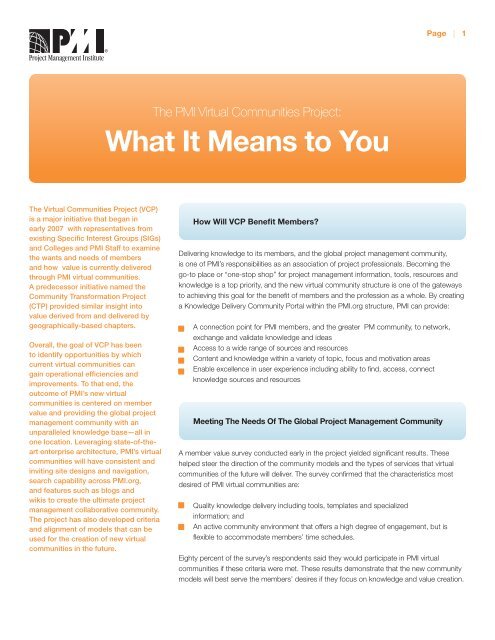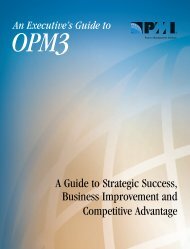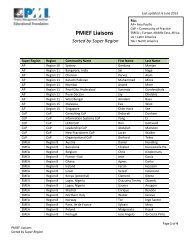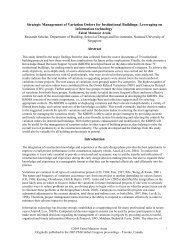What It Means to You - Project Management Institute
What It Means to You - Project Management Institute
What It Means to You - Project Management Institute
Create successful ePaper yourself
Turn your PDF publications into a flip-book with our unique Google optimized e-Paper software.
Page | 1<br />
The PMI Virtual Communities <strong>Project</strong>:<br />
<strong>What</strong> <strong>It</strong> <strong>Means</strong> <strong>to</strong> <strong>You</strong><br />
The Virtual Communities <strong>Project</strong> (VCP)<br />
is a major initiative that began in<br />
early 2007 with representatives from<br />
existing Specific Interest Groups (SIGs)<br />
and Colleges and PMI Staff <strong>to</strong> examine<br />
the wants and needs of members<br />
and how value is currently delivered<br />
through PMI virtual communities.<br />
A predecessor initiative named the<br />
Community Transformation <strong>Project</strong><br />
(CTP) provided similar insight in<strong>to</strong><br />
value derived from and delivered by<br />
geographically-based chapters.<br />
Overall, the goal of VCP has been<br />
<strong>to</strong> identify opportunities by which<br />
current virtual communities can<br />
gain operational efficiencies and<br />
improvements. To that end, the<br />
outcome of PMI’s new virtual<br />
communities is centered on member<br />
value and providing the global project<br />
management community with an<br />
unparalleled knowledge base—all in<br />
one location. Leveraging state-of-theart<br />
enterprise architecture, PMI’s virtual<br />
communities will have consistent and<br />
inviting site designs and navigation,<br />
search capability across PMI.org,<br />
and features such as blogs and<br />
wikis <strong>to</strong> create the ultimate project<br />
management collaborative community.<br />
The project has also developed criteria<br />
and alignment of models that can be<br />
used for the creation of new virtual<br />
communities in the future.<br />
How Will VCP Benefit Members?<br />
Delivering knowledge <strong>to</strong> its members, and the global project management community,<br />
is one of PMI’s responsibilities as an association of project professionals. Becoming the<br />
go-<strong>to</strong> place or “one-s<strong>to</strong>p shop” for project management information, <strong>to</strong>ols, resources and<br />
knowledge is a <strong>to</strong>p priority, and the new virtual community structure is one of the gateways<br />
<strong>to</strong> achieving this goal for the benefit of members and the profession as a whole. By creating<br />
a Knowledge Delivery Community Portal within the PMI.org structure, PMI can provide:<br />
– A connection point for PMI members, and the greater PM community, <strong>to</strong> network,<br />
exchange and validate knowledge and ideas<br />
– Access <strong>to</strong> a wide range of sources and resources<br />
– Content and knowledge within a variety of <strong>to</strong>pic, focus and motivation areas<br />
– Enable excellence in user experience including ability <strong>to</strong> find, access, connect<br />
knowledge sources and resources<br />
Meeting The Needs Of The Global <strong>Project</strong> <strong>Management</strong> Community<br />
A member value survey conducted early in the project yielded significant results. These<br />
helped steer the direction of the community models and the types of services that virtual<br />
communities of the future will deliver. The survey confirmed that the characteristics most<br />
desired of PMI virtual communities are:<br />
• Quality knowledge delivery including <strong>to</strong>ols, templates and specialized<br />
information; and<br />
An active community environment that offers a high degree of engagement, but is<br />
flexible <strong>to</strong> accommodate members’ time schedules.<br />
Eighty percent of the survey’s respondents said they would participate in PMI virtual<br />
communities if these criteria were met. These results demonstrate that the new community<br />
models will best serve the members’ desires if they focus on knowledge and value creation.
Page | 2<br />
A New World For Collaboration And Knowledge Sharing<br />
Two different models for PMI virtual communities are being launched: Forum and Community of Practice (CoP). The Forum community type<br />
is discussion board-driven and focused on knowledge exchange through member collaboration, discussion threads and document sharing.<br />
The more complex of the two models is the CoP. This community type offers a greater number of features and services than the Forum<br />
model. In addition <strong>to</strong> discussion boards, wikis, and blogs, the CoP will provide services such as professional development opportunities<br />
through webinars and potentially knowledge sharing conferences.<br />
The two models are a departure from the current practice for SIGs and Colleges. The new community models are different in governance<br />
structure in that they are no longer separately incorporated; rather, they are integrated communities within PMI. One of the benefits will be<br />
<strong>to</strong> allow community leaders <strong>to</strong> focus significantly more on delivering knowledge and value <strong>to</strong> the membership, as opposed <strong>to</strong> managing<br />
administrative and financial issues.<br />
Three distinct focus areas for PMI virtual communities have been identified. To align with the project management profession by organizing<br />
the knowledge within these focus areas, virtual community team members maximize synergies and eliminate duplication across the different<br />
virtual communities.<br />
These distinct focus areas are:<br />
- Knowledge domains, aligned <strong>to</strong> knowledge areas of the PMBOK ® Guide, PMI global standards, and/or the PMI family of professional<br />
credentials and other services.<br />
- Industry domains, built around project management knowledge inherent within unique industry groups.<br />
- Affinity communities, comprised of individuals who share common <strong>to</strong>pics of interest or affinity <strong>to</strong> <strong>to</strong>pics not captured in a specific<br />
knowledge area or industry.<br />
Building Member Value<br />
In order <strong>to</strong> best serve member needs, each community type is required <strong>to</strong> provide a specified set of core services. Optional extended<br />
services may be provided as well. Communities of Practice are structured <strong>to</strong> provide more services than Forums, and therefore require more<br />
administrative roles <strong>to</strong> manage. Still, both community types will be governed by a Community Council, comprised of multiple leadership<br />
roles. As they are <strong>to</strong>day, leadership positions will be elected by community members.
Page | 3<br />
<strong>What</strong>’s Happening Now<br />
As a member of a current SIG or College, you will begin <strong>to</strong> notice the collaboration that is taking place <strong>to</strong> enable the transition <strong>to</strong> the new<br />
virtual community structure. The SIG and college leaders have been dedicating their volunteer time and attention <strong>to</strong> providing insights on<br />
what members need and how <strong>to</strong> ensure that consistent value will continue <strong>to</strong> be delivered in the future.<br />
An important miles<strong>to</strong>ne was reached on 12 August 2008, with the launch of the International Development Forum and Human Resources<br />
Community of Practice pilot. The pilot was developed through the collaboration of the HR and ID SIG leaders, many volunteers, PMI<br />
Community and Information Technology staff, and a design and usability firm with international experience. Needs interviews, usability<br />
testing, and pro<strong>to</strong>type testing have been vital <strong>to</strong> the design process, with iterative releases reflecting the feedback gained from user testing.<br />
A second release was launched 18 September 2008, at which time all members of the current HR and ID SIGs will be invited <strong>to</strong> participate.<br />
Valuable user feedback will be gathered and discussed at the PMI Leadership <strong>Institute</strong> Meeting, taking place in Denver, Colorado, USA,<br />
16-18 Oc<strong>to</strong>ber 2008. The next community <strong>to</strong> transition in<strong>to</strong> the new virtual community environment will be the Consulting SIG. This pilot is<br />
expected <strong>to</strong> launch in late Oc<strong>to</strong>ber 2008.<br />
Stay Tuned And Get Involved<br />
In an effort <strong>to</strong> provide information on VCP and what it means <strong>to</strong> PMI members, several articles will appear in a special section of the<br />
Oc<strong>to</strong>ber 2008 edition of PMI Today ® . Updates will also be provided in this and other PMI publications as progress continues <strong>to</strong> be made in<br />
this exciting project.<br />
If you have questions or concerns about the Virtual Communities <strong>Project</strong>, please speak with your SIG/College leaders and SIG/College<br />
Men<strong>to</strong>rs. The VCP is supported by a PMI internal cross-functional team, as well as by the Virtual Communities Advisory Group (VCAG),<br />
which consists of experienced PMI leaders. The VCAG is actively involved in all actions and decisions of the project and represent the voice<br />
of the members.<br />
Specific questions may also be directed <strong>to</strong> vcp@pmi.org.







